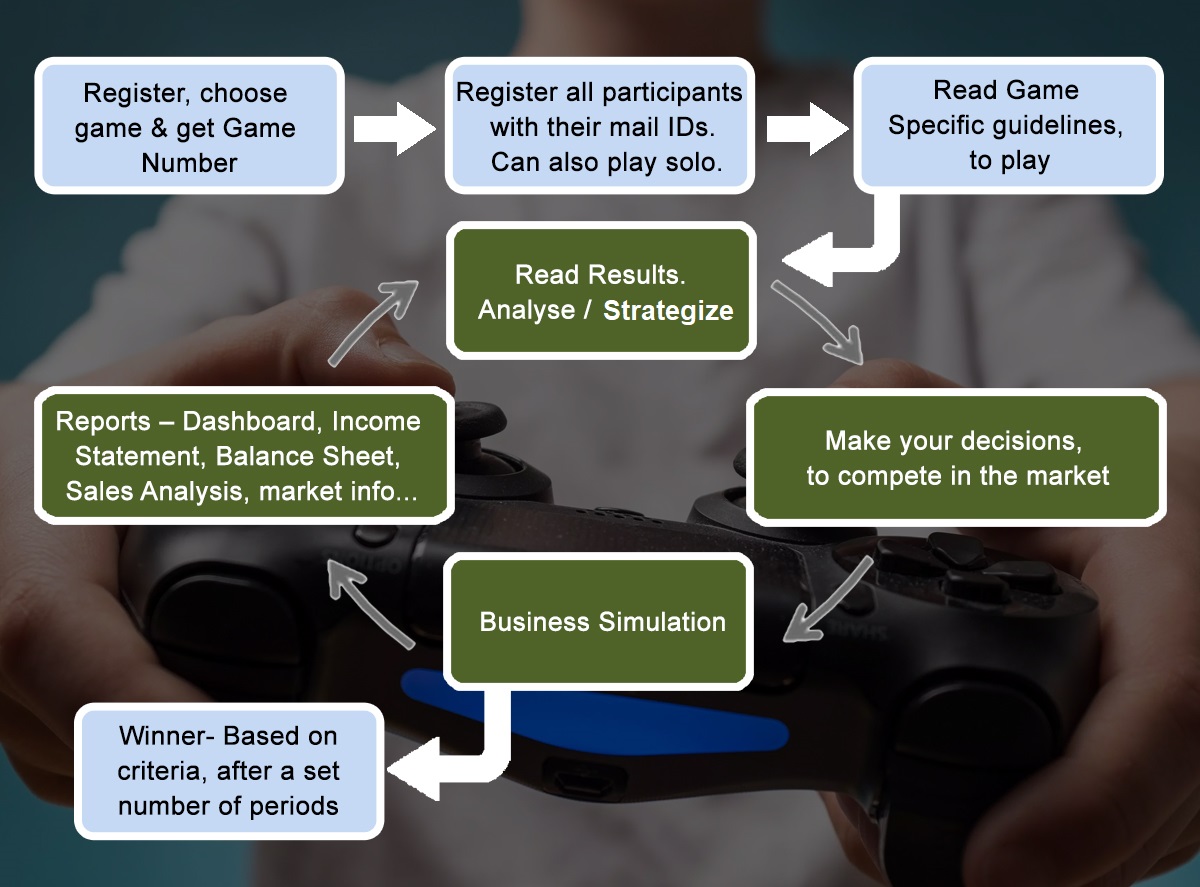How to Play
You are given a virtual company to run – successfully and profitably
As a Trainee
- Register all team members
- Trainers / coordinators would set up a game. Or you can choose a game to play solo
- Read “Game Specific” guidelines, and “Reports”. You are provided with a description of the virtual economy and the industry
- Forecast the demands and produce / procure products and place them in the market
- Analyze your finance, operations, R&D, Brand, New Product Launch, and all other business activities
- Input ‘your decisions’
- The decisions of all teams will be processed, the market will be simulated, and the outcome will be provided in “Reports” (for each period)
- The periodic Reports contain Income Statement, Balance Sheet, details of sales, and competition details, among others. It also includes a “dashboard”. Based on these Reports, make further decisions for the next period
- Period after period, make your decisions and play till the end of the Game. See how you fared in competition
Who Wins in the game?
Maximizing profits is the objective. The team making highest profits would be the winner. You may set other goals, such as maximizing return on investment, stake holder value or market cap etc. But all teams win, by learning concepts, competition and internalizing them.
Trainers / facilitators: How to set up a game
- Select a game based on topic of interest
- Divide the trainees into teams of 4 members or less and assign team leaders to each team.
- Advise all learners (team members) to register on whatifgames.com
- Enter the names (mail IDs) in the selected game, against their respective teams
- Next, set the opening GDP Growth, Policy Interest, and Inflation Rate
- Save the settings
- With the above actions you have setup the game for trainees to play
- Only the team leaders will input the decisions, while others can view, discuss, and collectively arrive at decisions

How to play solo game
- Register on whatifgames.com if you have not done already
- Select a game based on topic of interest
- Select to play ‘Solo’ game
- Next, set the opening GDP Growth, Policy Interest, and Inflation Rate
- Save the settings
- With the above actions you have setup the game for yourself. Proceed to game
- Read “Game Specific” guidelines, and “Reports”. You are provided with a description of the virtual economy and the industry
- Forecast the demands and produce / procure products and place them in the market.
- Manage finance, operations, R&D, Brand, New Product Launch, and all other business activities through decisions.
- Input ‘your decisions’
- The computer plays as competitors (bots)
- The decisions of all teams will be processed, the market will be simulated, and the outcome will be provided in “Reports” (for each period).
- The periodic Reports contain Income Statement, Balance Sheet, details of sales, and competition details, among others. It also includes a “dashboard”. Based on these Reports, make further decisions for the next period.
- Period after period, make your decisions and play till the end of the Game. See how you fared in competition
Trainers / Facilitators who wish to Custom-design What-if games
- What-if games design methodology provides ample flexibility to create new games of any preferred set of specifications
- A new game can be custom designed within a short time on request based on choice of a set of following simulation features. (Too many features may not be advisable because the effect of individual variables may not be identifiable).
Production Related
- Raw Material Purchase
- After sales Service
- Demand Fulfilment Factor *
- Service Fulfilment Factor
- Outsourcing of finished goods
- Different levels of Packaging
- R&D for production technology
Quality Related
- Certification and Process Training
- Product Returns
Stock Market
- Prices on Stock Market*
Surprise Elements
- Natural Calamities
Sales Related
- Sales and distribution*
- Bulk sales - responding to RFQs
- Price Discounts
Product Related
- Product Development - Additional features
- New Product Introduction and related R&D
Marketing and Branding
- Communication in different forms
- Different Packaging Levels
- Promotions through freebies
- Variable Trade Margin
- Fixed Trade Margins to providers
- Franchisee for service with(out) Security deposit
-* Included in all games
